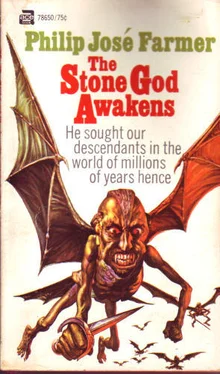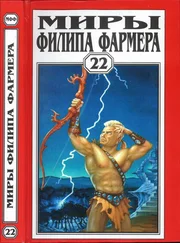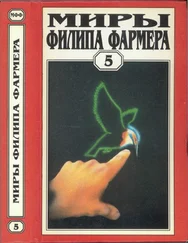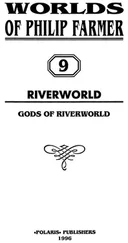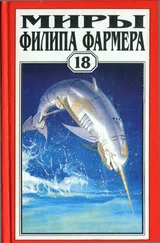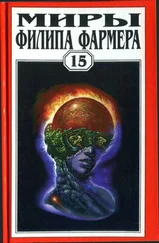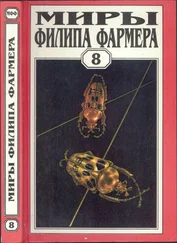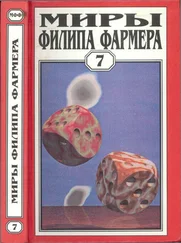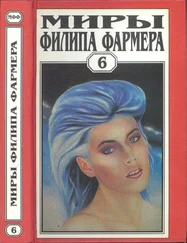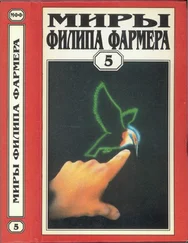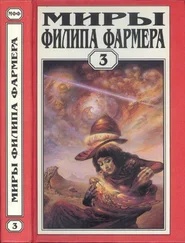He had been stone. He was found on the bottom of a lake that had been emptied by a great earthquake. He was attached to a stone chair, and his elbows were on a piece of stone. He was sitting in the stone chair and leaning forward. He was so heavy that it took the efforts of all the males of two villages to lift him out of the mud and drag him on rollers to the larger of the villages. There he had been set up on the granite throne which had been prepared for him many generations before.
Ulysses Singing Bear asked her about the throne. Who had prepared it? He had seen nothing to indicate that the Wufea carved stone.
The throne had been found in the ruins of a mighty city of the Ancients, she said. She was very vague about the identity of the Ancients or the location of the city. Somewhere to the south. In those days, twenty generations ago, the Wufea had been located many marches to the south. It was a plain then, with thousands of game animals roaming it. Then Wurutana had grown over the site of the villages and the city of the Ancients, and the Wufea had been forced to move northward to escape the shadow of Wurutana. Just as they would have had to move again in another generation if Wuwiso had not been hit by lightning and been unstoned, become fleshed.
The lightning stroke, it seemed, had hit him during the storm that occurred when the Wagarondit attacked. It had also set fire to the temple. The other fires were set by the Wagarondit.
That night, Ulysses went outside his new quarters in the temple. He looked up at the sky and wondered if he could be on Earth. He did not know how he could be elsewhere. But if he was on Earth, what was the year?
The stars formed unfamiliar constellations, and the moon seemed to be larger, as if it were nearer to Earth. Nor was it the naked, silver body he had known in 1985. In fact, it looked much like Earth as seen from a satellite. If it were the Moon, it had beenterrafied. Its rocks had been treated to give it air, form soil and yield water. In history, there had been articles speculating on the possibility of terrafication, but the chances for even beginning the process would not occur until several centuries from then.
If he was certain of one thing, other than that he was alive, it was that far more than a few centuries, or a few millennia, had passed since 1985.
For one thing, it would take millions of years for a humanoid sentient to evolve from felines. In fact, the evolution should be, theoretically, impossible. The felines of his day were too specialised to change into these creatures. They were in a blind alley.
It was, however, possible that the Wufea were not descended from felines. The Siamese cat appearance might be misleading. Perhaps they were descended from some other genus. Bipedal sentients might evolve from racoons. They were generalised enough. But human-handed bipedal sentients from the pussycat of his day?
Maybe the cat-like Wufea and the racoon-like (but also cat-like) Wagarondit were descended from a racoon or maybe even a primate, a lemur, for instance. It did not seem likely, considering the eyes. In fact, it seemed impossible. And why the retention of the tails? They served no useful purpose of which he knew. Evolution had cut off the tails of the great apes of the hominids. Why had it not done so with these creatures?
Also, there was the other animal life to consider. There were horses, smaller versions of the thoroughbreds of his day, which ranged the plains to the south. Another species, or variety, roamed the forest. They provided food for the Wufea, who had not as yet thought about riding them. The horses were unchanged in any significant features. But there was an animal with a delicate face and a giraffe-like neck that fed on the leaves of trees. He would swear that that animal was evolved from the horse.
There was a flying squirrel, although not the gliding animal of his time; this had bat-like wings and flew like a bat. But it was a rodent, and it must have evolved from the gliding squirrel.
There was also a bird, standing twelve feet high on very thick legs, which looked very much as if its ancestor had been the tiny roadrunner of the Southwest.
And there were other animals whose existence meant many millions of years of evolution from the forms he had known.
Awina had been curious about his life before he was turned into stone. He thought it better to say little about it until he found out what she expected his life to have been. She told him the few religious stories about Wuwiso. Essentially, he was one of the ancient gods, the only one to have survived a terrifying battle between them and Wurutana, the Great Devourer. Wurutana had conquered, and the other gods were destroyed. All except Wuwiso. He had escaped, but to trick his enemy, who was tracking him down, he had turned himself into stone. Wurutana had not been able to damage the stone god, but he had taken the god and buried him under a mountain where nobody would ever find him. Then Wurutana had started to grow, to cover the Earth.
In the meantime, Wuwiso lay at the heart of the mountain, unfeeling, unknowing, uncaring. And Wurutana was happy about this. But even Wurutana was not as great as the greatest of all gods, Time. Time washed away the mountain, and eventually a river carried the stone god down a canyon and deposited him at the bottom of a deep lake. And then an earthquake tilted the lake and dumped out the waters and the Wufea found the stone god, as was prophesied. And the Wufea had been waiting for many generations, waiting for the prophesied stroke of lightning which would bring their deliverer back to life. And, finally, at the hour of the Wufea's greatest peril, as had been foretold, the storm had covered the land and the lightning stroke had freed Wuwiso from the bonds of stone.
Ulysses Singing Bear did not doubt that there were some elements of truth in this myth.
In 1985 — how many epochs ago? — he was a biophysicist working on Project Niobe. He was halfway through getting his Ph. D. at nearby Syracuse University. The goal of the project was the development of a "matter-freezer," as it was referred to by the project workers. The device was capable of stopping for an indeterminate time all atomic movement in a piece of matter. The molecules and the atoms, and the parts that made up the atoms — the protons, neutrons and so forth — would cease all motion. A bacterium subjected to the energy complex rayed out by the matter-freezer would become a microscopic statue. It would be as if made of stone but of an indestructible stone. Nothing — acids, explosives, atomic radiation, great heat — could destroy it.
The device had possibilities both as a preserving agent and as a "death ray," or a "life ray," if one preferred that term. But, so far, it was impractical because of its extreme short range and its demand for enormous power. Also, there was not even a theory as to how the "petrified" matter could be "depetrified."
Bacteria, a sea urchin egg, an earthworm and a rat had been "petrified." The morning that Ulysses fell into his long sleep, he was working on an experiment in which a pygmy laboratory pig would be rayed. If the experiment was successful, the next step would be to petrify a pony.
Everything had gone as before — up to a point. Ulysses was seated at his desk but was almost ready to get up and walk across the room to the control console he supervised. The power had been turned on, and the matter-freezer was warming up. Across his desk he could see the panel which held the power indicators and a number of other meters and gauges.
Suddenly, the needle of the big power meter had swung around to the red. The operators had cried out, and one had jumped up. Ulysses had looked up just as the needle swung around. And that was all he remembered. There was nothing between then and the time he had opened his eyes in the burning temple.
Читать дальше
